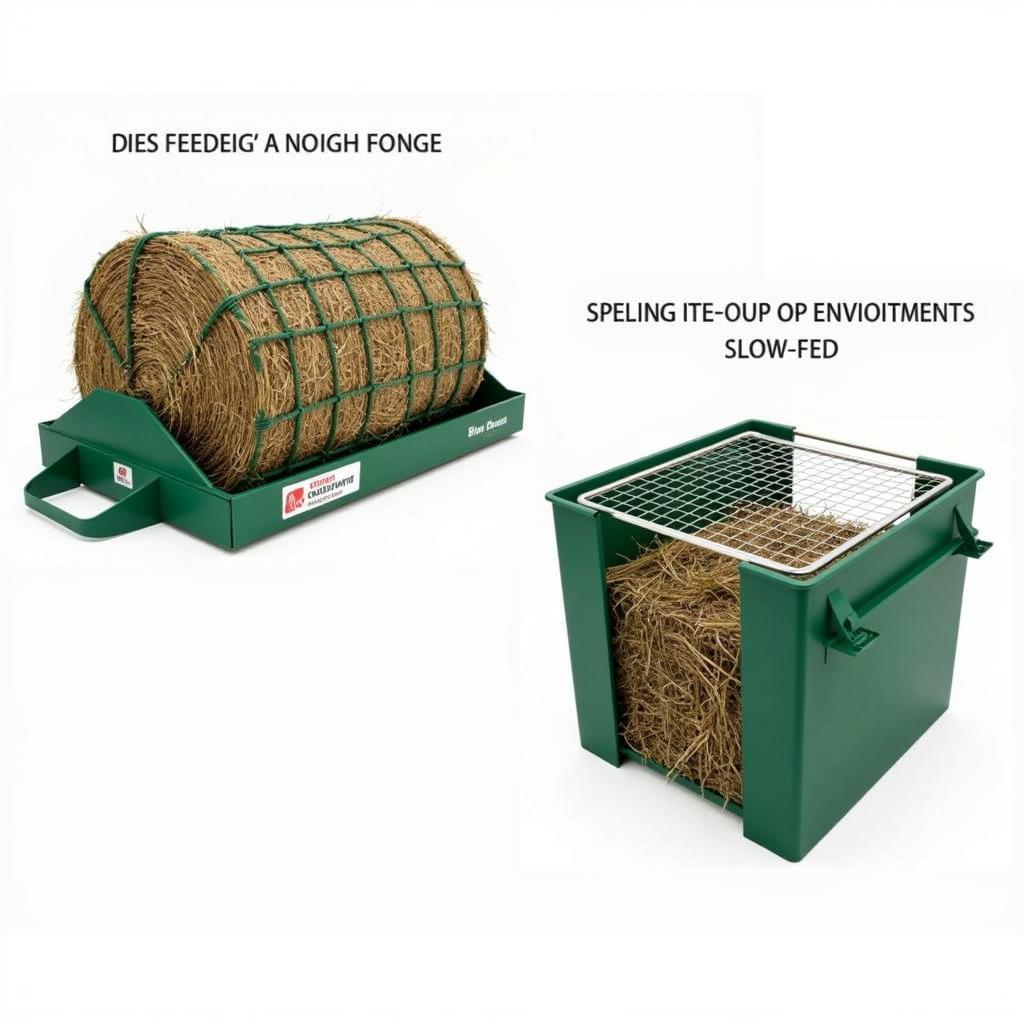Slow feeders are a game-changer for horse owners aiming to mimic natural grazing patterns and improve their horse’s digestive health. If you’re searching for the Best Slow Hay Feeder For Horses, you’ve come to the right place. This article will delve into the benefits of slow feeding, explore various types of slow feeders, and provide tips for choosing the perfect one for your equine companion.
Why Choose a Slow Hay Feeder?
Horses are designed to graze for up to 16 hours a day. Traditional feeding methods often leave horses with long periods without forage, leading to boredom, digestive issues, and unhealthy weight gain. A slow hay feeder helps to alleviate these problems by extending feeding time and promoting smaller, more frequent meals, much like natural grazing. This helps to prevent gastric ulcers, reduce the risk of colic, and maintain a healthy weight. Plus, a slow horse feeder can minimize hay waste, saving you money in the long run.
Different Types of Best Slow Hay Feeder for Horses
There’s a wide variety of slow feeders on the market, each with its pros and cons. Choosing the right one depends on factors like your horse’s individual needs, your budget, and your management style.
Small Hole Hay Nets
Hay nets with small holes are a popular and affordable option. They slow down consumption by limiting the amount of hay a horse can pull out at once. However, some horses can become frustrated with very small holes, so finding the right balance is crucial.
Hay Bags
Hay bags are another affordable option for slow feeding. These are typically made of durable material with small openings to restrict hay access. Similar to hay nets, choosing the right hole size is important for preventing frustration.
Bale Feeders
Bale feeders are designed to hold entire hay bales and often incorporate slow feeding mechanisms like grates or nets. They are a convenient option for feeding multiple horses or providing a larger supply of hay at once.
Ground Feeders
Ground feeders are placed directly on the ground and can be a good option for horses who prefer to graze naturally. They often have a grid or net on top to slow down consumption. However, they can be more susceptible to contamination if not managed properly.
 Bale and Ground Feeders for Slow Feeding Horses
Bale and Ground Feeders for Slow Feeding Horses
How to Choose the Best Slow Hay Feeder for Horses
Choosing the best slow hay feeder for horses involves considering several factors. What works for one horse might not work for another. Here’s a breakdown of things to consider:
-
Horse’s Temperament: If you have a particularly anxious or frustrated horse, opt for a feeder with slightly larger holes or openings to prevent frustration. You may also consider a horse ball feeder for a fun and engaging feeding experience.
-
Hay Type: The type of hay you feed can influence your feeder choice. Fine-stemmed hay might work better in nets with smaller holes, while coarser hay might require larger openings.
-
Durability: Choose a feeder made of strong, durable materials that can withstand wear and tear from your horse. A no waste hay feeder for horses will be more economical in the long run.
-
Ease of Cleaning: Regular cleaning is essential to prevent mold and bacteria growth. Opt for a feeder that is easy to clean and maintain.
-
Budget: Slow feeders range in price from affordable nets and bags to more expensive bale feeders. Choose an option that fits your budget. If you are concerned about the cost of hay, consider exploring our article on why a horse not eating grain but eating hay can be beneficial.
Conclusion
Finding the best slow hay feeder for horses is a crucial step in optimizing their digestive health, preventing boredom, and encouraging natural grazing patterns. By considering your horse’s individual needs and exploring the different options available, you can ensure your horse receives the best possible care. A slow feeder is a valuable investment in your horse’s long-term health and well-being.
FAQs
- How long should a horse take to finish a slow feeder? This depends on the size of the feeder and the size of the holes, but generally, a slow feeder should keep a horse occupied for several hours.
- Can I use a slow feeder for all my horses? Yes, but you may need multiple feeders, especially if you have a large herd.
- Are slow feeders safe for horses? Yes, when used correctly. Ensure the feeder is securely fastened and free from any sharp edges.
- Can I use a slow feeder for other livestock? Yes, slow feeders can be beneficial for other grazing animals like goats and sheep.
- How do I clean a slow hay feeder? Most slow feeders can be rinsed with water and a mild detergent.
For further information on horse housing and feeding, you might find our article on hay feeder for horses with roof useful.
Need help choosing the right slow feeder? Contact us at Phone: 0772127271, Email: [email protected] or visit us at QGM2+WX2, Vị Trung, Vị Thuỷ, Hậu Giang, Việt Nam. Our customer service team is available 24/7.